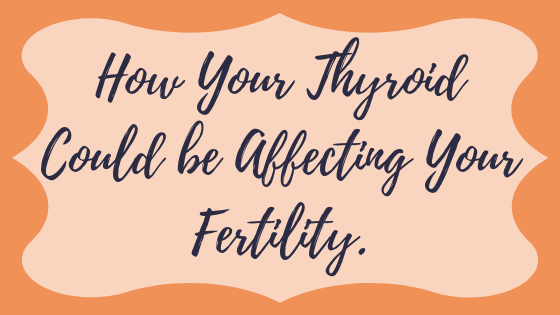The thyroid is part of a larger system in your body called the endocrine system. This system includes the thyroid, pancreas, adrenals, ovaries, and the pituitary/hypothalamus. While each of these organs play their own part in our body, they are all intertwined and if something is off with one then inevitably it will affect all the others. Let’s take a look at how the Thyroid can affect your fertility.
The Thyroid’s main job in your body is to regulate your metabolism. Metabolism is how your body takes the nutrients you eat and turn them in to energy this energy is turned into all sorts of things in your body like controlling your body temperature. This brings us to the first way that your thyroid affects your fertility. A fetus needs your uterus to be just the right temperature to properly thrive so if your body temperature is not in the right window then you may not be able to sustain a pregnancy. In order for this to be the case you would have to become pregnant first and you can’t get pregnant if you aren’t ovulating. Thyroid hormone helps with follicle development in the ovary. Without the right amount of thyroid hormone, the ovary won’t be able to properly build an egg which may delay ovulation or if it is ovulated the egg won’t be of good quality.

The event of ovulation is also affected by thyroid hormone; in fact, it is thyroid hormone that helps stimulate the pituitary to send out luteinizing hormone (LH). LH is supposed to surge to it’s highest levels mid cycle thus letting the ovary know it’s time to let go of the egg. However, if you have an over active thyroid your body may be producing higher amounts of LH throughout your entire cycle so when it comes time to surge the difference in the highest amount produced isn’t enough of a jump to stimulate the ovary to ovulate. With an under-active thyroid your body just doesn’t produce enough LH at any point in your cycle to stimulate ovulation.

Thyroid health is not something that I would guess with if you feel like you might have thyroid issues, I would highly recommend seeing a functional medicine doctor and asking for a full thyroid panel. Most doctors only check TSH and maybe T4 but these are not sufficient for knowing if your thyroid is truly functioning properly. TSH or Thyroid Stimulating Hormone is what your pituitary releases to tell your thyroid to produce T4. This isn’t even from your thyroid! Although if it is off it can tell you that something is up but something can be up and your TSH still look fine. T4 while at least being made in the thyroid is not the active form of thyroid hormone T3 is so again we have the same problem as TSH if T4 is off we know that something is up but something can be up without T4 being out of whack. Meaning it is very important to get the full picture; a thyroid panel should include TSH, T4, T3, rT3, and thyroid antibodies.
No matter the results of your tests it is important that we nourish our thyroids for optimal fertility. This starts first and foremost with the diet. Thyroid hormone needs four things to be produced: fat, tyrosine, iodine, and selenium. While the last three can be supplemented directly I highly advise working with a skilled practitioner as they are difficult to dose properly. This is why I suggest instead supplementing them with diet because when taken in naturally the body is better able to control absorption.

There is one final piece to healthy thyroid function and that’s STRESS. I believe chronic stress is one of the biggest factors in our health issues today and it certainly plays a part in thyroid malfunction. Chronic stress affects your digestion which can lead to leaky gut which can lead to autoimmune issues like Hashimoto’s Thyroiditis. Also, 20% of the conversion of T4 to T3 happens in your gut by your gut bacteria which means that you may be working at only 80% capacity if your gut bacteria have been killed off by chronic stress. Finally, chronic stress puts out excess cortisol which causes our thyroid to convert T4 to what is referred to as reverse T3 (rT3) instead of the proper and active form of T3. rT3 is not active so when this happens you end up with hypothyroid symptoms and fertility issues. It is so so important to make sure that you are dealing with your stress properly. To learn more about how Chronic Stress can be affecting your fertility and 5 steps you can take now to help deal with stress sign up here.

